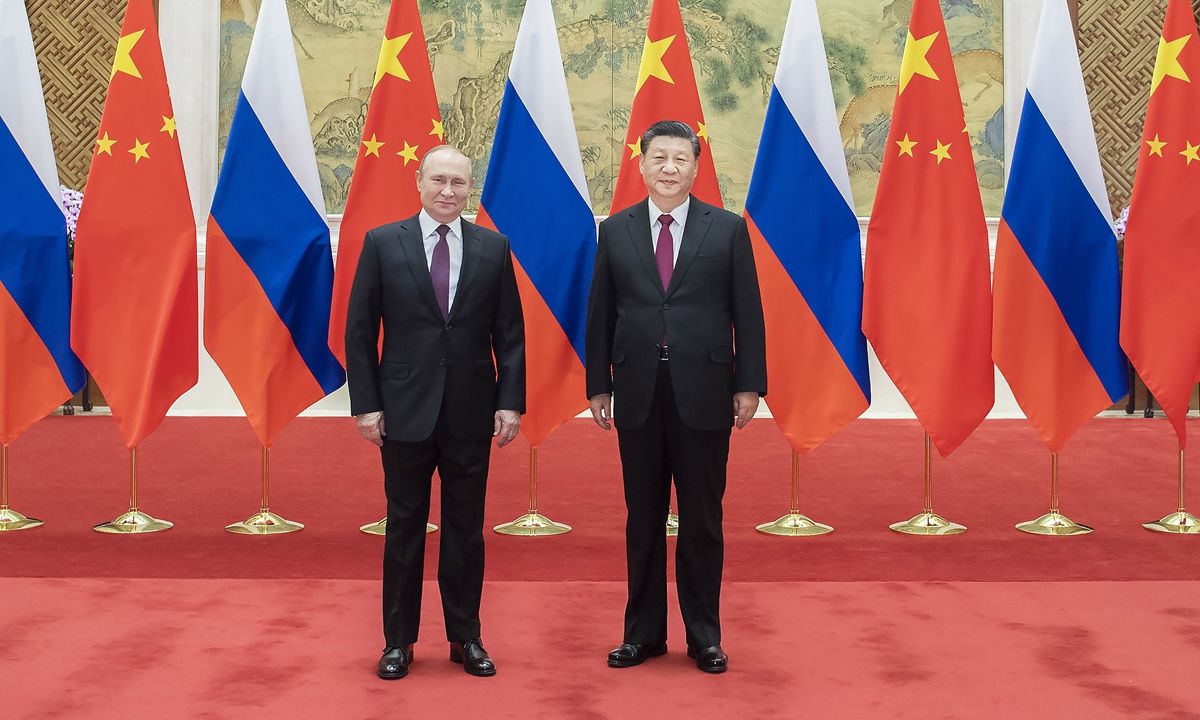
Chinese President Xi Jinping (right) meets and holds talks with visiting Russian President Vladimir Putin at the Diaoyutai State Guesthouse in Beijing on February 4, 2022. Photo: Xinhua
The presence of Russian President Vladimir Putin at the opening ceremony of the Beijing 2022 Olympic Winter Games is telling. The meeting between Chinese President Xi Jinping and Putin on Friday also carried significant weight, as the two leaders not only draw a new blueprint for bilateral relations, but also promote world stability and development in a post-pandemic period against the backdrop of intensifying geopolitical and economic conflicts and fierce competition among major powers.
A model of neighborly, major power relations
Since the end of the Cold War, China and Russia, learning from history and based on their national interests, have established good-neighborly relations and a partnership of strategic coordination, which were confirmed legally with the signing of the China-Russia Treaty of Good-Neighborliness and Friendly Cooperation in 2001, setting a model for neighbors and major powers. The features of this bilateral relationship are maintaining independence and treating each other as equals; good-neighborliness and friendly cooperation; no-alliance, nonconfrontation and not targeting third countries. The bilateral treaty was extended in 2021 and given a new connotation.
China-Russia relations, at a high level, are endogenous and stable. With close political ties and well-developed mechanisms for exchanges and cooperation, the two countries share a high level of political mutual trust and are economically interdependent. Trade between China and Russia grew from $5.86 billion in 1992 to $107.76 billion in 2020, and surpassed $140 billion in 2021, with an optimized structure of trade goods. China has been Russia's top trading partner for 12 consecutive years, and Russia has always been among China's major trade partners. A partnership for energy cooperation was also consolidated by joint efforts in the fields of oil and gas, nuclear energy and electricity. Among the 15 documents signed during the meeting of the two leaders on Friday, three are related to energy.
The pillar of world stability
The international community is currently facing serious security challenges and problems. Strategic weapons such as anti-ballistic missiles (ABM) and intermediate-range nuclear forces (INF) developed by major forces are eroding global and regional stability. The US is containing China in the Asia-Pacific region, engaging in military confrontation with Russia in Europe and inciting chaos in the regions surrounding China and Russia.
As major powers, China and Russia are responsible for maintaining world peace. Both countries have promoted multipolarity and opposed unipolar hegemony, such as the US withdrawal from the ABM and INF treaties, its deployment of a global ABM system, and its formation of "sinister gangs" of Quad and AUKUS. Through diplomatic and military means, China and Russia have actively cooperated on the Korean Peninsula nuclear issue, the Iran nuclear issue and the Afghanistan issue after the hastened US withdrawal. The two countries agree that the strategic partnership of coordination can meet their political needs and they have no intention to form a military alliance.
During their meeting in Beijing, the Chinese and Russian leaders reiterated their common position on maintaining world stability and reached a new consensus on jointly safeguarding global strategic stability and regional security. The two countries will safeguard the international system with the UN at the core and maintain international order based on international law.
Leading forces of economic globalization, regionalization
In recent years, the process of globalization and regionalization has been severely challenged. An anti-globalization trend is on the rise and the US has resumed unilateralism and protectionism and set aside WTO rules, which seriously disrupted the globalization process. The US and the West have also been politicizing regional cooperation. The sluggish process of globalization and regionalization, coupled with the ravaging pandemic, has severely hampered global economic recovery.
While strengthening bilateral economic and trade cooperation, China and Russia are actively maintaining the mainstream of economic globalization to promote world economic recovery. The two countries should continue to safeguard the multilateral trading system of the WTO, promote the full implementation and timely improvement of existing rules, jointly oppose trade protectionism and promote the establishment of an open world economy.
China and Russia will jointly promote economic integration of the Asia-Pacific region and resist the fragmentation and politicization of regional cooperation. China and Russia will develop economic and trade cooperation under the framework of the Shanghai Cooperation Organisation and promote the integrated development of East Asia, Eurasia and South Asia.
The meeting of Chinese and Russian leaders in Beijing will bring China-Russia relations to a higher level and inject a strong China-Russia joint force into the world's stability and development.
The author is head of the Russian Foreign Policy Research Department at the Institute of Russian, Eastern European and Central Asian Studies, Chinese Academy of Social Sciences. opinion@globaltimes.com.cn




